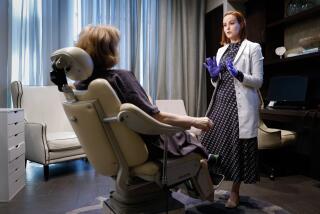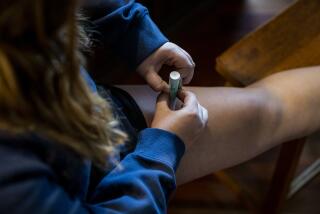Allergan may sell Lap-Band unit amid declining sales

Allergan Inc. is considering selling its Lap-Band weight-loss unit amid rapidly declining sales and a swarm of negative publicity about patient deaths and a criminal investigation of one of its former customers.
Word of the potential sale came the same day the company disclosed that sales of the Lap-Band fell for the fifth consecutive quarter. The company reported $37.4 million in Lap-Band sales for the third quarter of 2012, a 25% decline from one year ago and 53% less than it sold in the third quarter of 2008.
“We’re exploring strategic options for the obesity intervention business, as the sales dynamics do not fit the profile of a high-growth company like Allergan,” Allergan chief David E.I. Pyott said Tuesday during a conference call with analysts. “Vigorous management of our portfolio businesses has always been integral to our strategy.”
The Lap-Band is a silicone ring that is surgically implanted around the stomach to discourage patients from overeating and help them lose weight. Allergan, which also sells wrinkle-reducing Botox, eyelash lengthener Latisse and a host of ophthalmologic pharmaceuticals, acquired the Lap-Band when it bought Santa Barbara-based Inamed in 2006.
Sales of Allergan’s obesity intervention products, primarily Lap-Band, peaked in 2008 with sales of $296 million. The global collapse of the economic markets in late 2008 hurt sales as consumers were less inclined to pay for elective surgeries.
Earlier this year, the company said it would no longer sell the device to a key customer, the surgery centers affiliated with the 1-800-GET-THIN ads that used to blanket Southern California freeway billboards, radio, television and the Internet.
That move came after the deaths of five patients after surgeries at the clinics and amid investigations by the Los Angeles Police Department and state Department of Insurance. It also followed a warning by the Food and Drug Administration that the 1-800-GET-THIN ads were misleading because they failed to adequately disclose risks of the surgery.
The Times reported this month that the FBI and Food and Drug Administration are conducting a criminal investigation of the businesses affiliated with 1-800-GET-THIN and the brothers behind the businesses, Michael and Julian Omidi. An attorney for the Omidis said he did not expect the investigation would lead to criminal charges.
That news, coupled with the decline in sales, might make this a good time for Allergan to sell the Lap-Band unit, said Tim Lugo, an analyst who covers Allergan for William Blair & Co.
“I guess maybe we shouldn’t be surprised, given the issues they’ve had,” Lugo said. “It’s a drag on growth. Any time you can sell off a unit that’s a drag on growth, I think that would be a great idea.”
ALSO:
GET-THIN brothers in fraud inquiry
Another patient dies after Lap-Band surgery
Follow Stuart Pfeifer on Twitter







